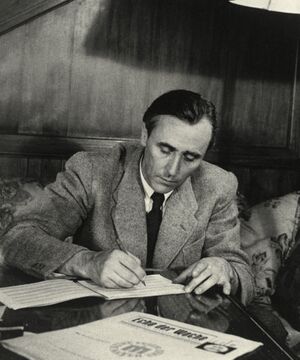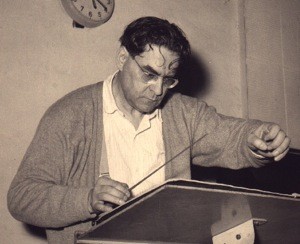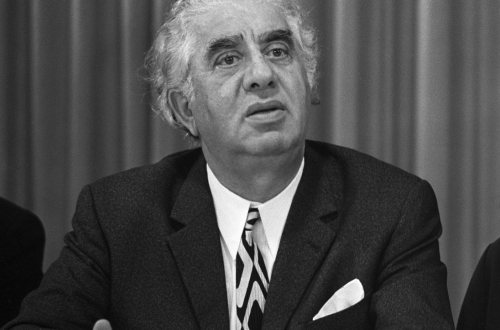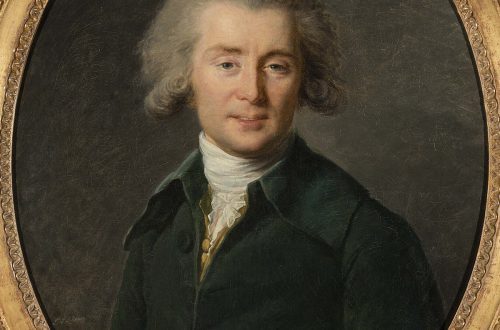
Werner Egk |
Werner Egk
German composer and conductor (real name – Mayer, Mayer). He studied at the Augsburg Conservatory, on composition he used the advice of K. Orff. From 1929 he was a conductor in a number of t-ditch, in 1936-41 – in the Berlin State. opera, from 1941 directed by prof. association of composers, in 1950-53 director of the Higher Music. schools Zap. Berlin. President of the West German. Union of Composers (since 1950), German. music Council (1968-71). Corresponding Member German Academy of Arts (since 1966, Berlin). Performs as a musician. publicist. In the operas and symphonic works of Egk, one can feel the affinity with the work of R. Strauss and I.F. Stravinsky (harmony and orchestration). Particularly significant are the achievements of the composer in the field of stage performances. music. Versatile art. Egk’s talent also manifested itself in the numerous opera librettos he wrote and the picturesque design of opera and ballet performances. In their stage prod. Egk includes atonal episodes, quotations from the music of the old masters, as well as diff. folk material. From the beginning 1930s Egk’s operas and ballets have firmly entered the German repertoire. t-ditch, among them – “Columbus”, “Magic Violin”, “Peer Gynt”, “Irish Legend” and “The Government Inspector” (recitative comic opera based on N.V. Gogol).
Compositions: operas. – Columbus (radio opera, 1932; stage ed. 1942), The Magic Violin (Die Zaubergeige, 1935; new ed. 1954, Stuttgart), Peer Gynt (1938, Berlin), Circe (1948, Berlin; new ed. 1966 , Stuttgart), Irish legend (Irische Legende, 1955, Salzburg, new ed. 1970), Government Inspector (Der Revisor, comic opera based on Gogol, 1957, Schwetzingen), Betrothal in San Domingo (Die Verlobung in San Domingo, 1963, Munich); ballets — Joan Zarissa (1940, Berlin), Abraxas (1948, Munich), Summer Day (Ein Sommertag, 1950, Berlin), The Chinese Nightingale (Die chinesische Nachtigal, 1953, Munich), Casanova in London (Casanova in London, 1969, Munich); oratorio Fearlessness and benevolence (Furchtlosigkeit und Wohlwollen, for tenor, choir and orchestra, 1931; new ed. 1959), 4 canzones (for tenor with orc., 1932; new ed. 1955), cantata Nature – Love – Death (Natur – Liebe – Tod, for baritone and chamber orchestra, 1937), hymn My Fatherland (Mein Vaterland, for choir and orchestra or organ, 1937), Variations on an old Viennese song (for coloratura soprano and orchestra, 1938), Chanson and romance (for coloratura soprano and small orchestra, 1953); for orc. – Olympic festive music (1936), 2 sonatas (1948, 1969), French suite (after Rameau, 1949; as a ballet in 1952, Heidelberg), Allegria (1952; as a ballet in 1953, Mannheim), Variations on a Caribbean theme (1959 ; as a ballet – under the name Danza, 1960, Munich), Violin music with orc. (1936), Georgica (Georgica, 1936); Temptation of St. Antonia (for viola and strings. quartet, 1947; as ballet 1969, Saarbrücken); for fp. – sonata (1947); music for drama performances. t-ditch, including the comedy “Magic Bed” (“Das Zauberbett”) Calderon (1945).
References: Krause E., “Inspector” on the opera stage, “SM”, 1957, No 9; Interview with a correspondent of the newspaper “Die Welt”, ibid., 1967, No. 10; W. Egk, Opern, Ballette, Konzertwerke, Mainz – L. – P. – NY, 1966; W. Egk. Das Bühnenwerk. Ausstellungskatalog, bearbeitet von B. Kohl, E. Nölle, Münch., 1971.
O. T. Leontieva





